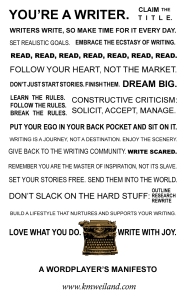At some point you may have seen “A Wordplayer’s Manifesto” by K. M. Weiland:
It is interesting to note the third line in which the term “Read” is repeated. Seemingly, this mild directive is seen as a valuable part of being a writer.
Perhaps, you may be wondering why bother to read when instead you should write. Maybe you’ve read since you were a kid. You’ve read for years, and it’s high time you focus on your own compositions. If you spend time reading, you will lose precious writing hours. And believe me, time management with writing while handling other responsibilities is a tough scale to balance. You might as well work on your projects.
Here’s the good news, especially for those who love to read. Reading when you’re a writer can be time well-spent. It doesn’t have to be a waste.
Think of it this way. When you read, you’re absorbing information. And it’s not just the story or the characters. You’re studying examples. That published book you’re reading is chock-full of good writing techniques (or maybe bad ones, in which case learn by negative example.) Maybe you struggle in writing dialogue. You write too much of it or you write too little. You start to get chatty and less concise and engaging. Maybe your character’s speech doesn’t sound natural. There are tons of books out there that can help you. And the nice thing is they don’t have to be textbooks. You could use a favorite novel and see what attracted you to its dialogue. Of course, you don’t have to copy the exact style. In fact, you’re probably better off not doing that. But you can get an idea.
Perhaps, you’ve already read a book. You’re also itching to read it again. It certainly doesn’t hurt. Actually, it will be a great opportunity to see the work with a more broadened perspective. You might be able to catch some details you missed. Basically, the advantage of knowing what’s going to happen allows you to focus on other aspects. You’re not sitting at the edge of your seat, wondering about a character’s fate. Your attention can be shifted to notice things such as how engaging a scene was, the nuances of change within characters, especially supporting ones (maybe it didn’t make sense the first time), or how minute details lead to certain events. The list goes on.
The point is that you’re not wasting time when you read. Even if you’re not the type to study examples or to analyze the details, you can find that reading, especially if you enjoy it, is a great way to relax from all the intense brainstorming sessions. Losing yourself in the pages of a good book may be the break you need.
